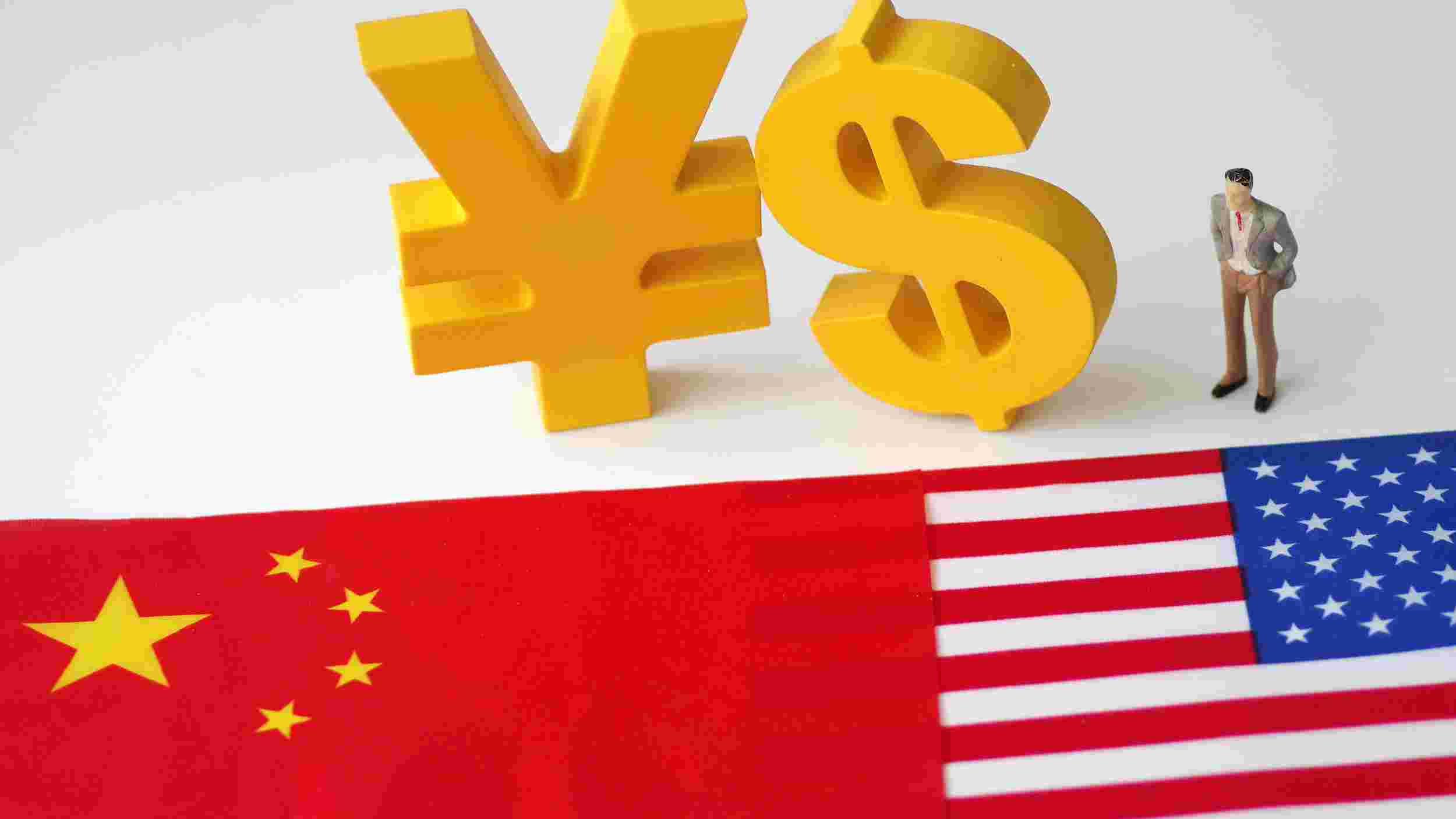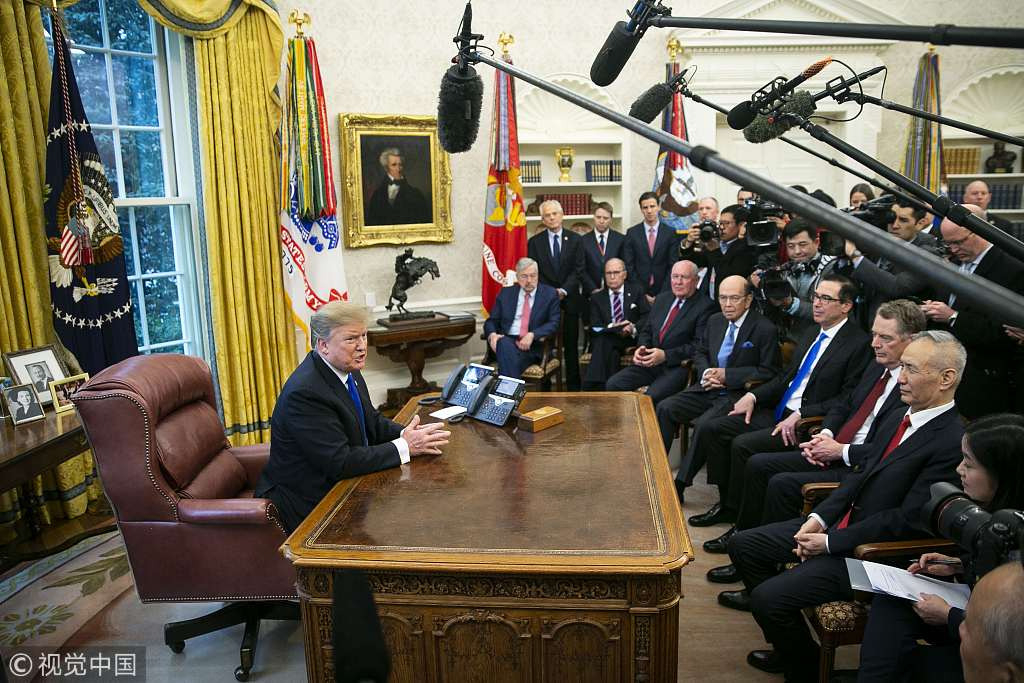
Opinion
22:33, 20-May-2019
Trade war against China pushes the U.S. to verge of turmoil
Rabi Sankar Bosu

Editor's note: Rabi Sankar Bosu, an Indian freelance contributor to Chinese media outlets, writes about Chinese politics, social and cultural issues, and China-India relations with special interest on the Belt and Road Initiative. The article reflects the author's views, and not necessarily those of CGTN.
The Sino-U.S. relationship has been called the “most important bilateral relationship” in the world. But unfortunately, the bilateral relationship has changed fundamentally ever since Donald Trump assumed the presidency in January 2017.
Critics say Trump's hyperactivity in foreign relations, more specifically relations with China, is a frog-in-the-well kind of perspective. Two years down the line, trade relations with China have deteriorated, and his actions as a U.S. president need questioning.
During his presidential campaign in 2016, the billionaire real estate mogul Trump regularly lambasted China on a host of issues from China's trading practices to Chinese manufacturing. He said China had "raped the U.S. economy.” As a president different from all who had gone before, Trump professed to put “America First” on all matters.
President Trump has made no secret of his desire for a "better" trading relationship with China. As a dealmaker, he has been using a "trade war" as a threat to gain more leverage from China in other areas. And in doing so, he blatantly undermines the global rule of law under the UN Charter, turning the World Trade Organization (WTO) into a toothless tiger with the highest numbers of complaints against the U.S.

A U.S. farmer walks through his soy fields as China's retaliatory tariffs hit the U.S. soybean market. /VCG Photo
A U.S. farmer walks through his soy fields as China's retaliatory tariffs hit the U.S. soybean market. /VCG Photo
In the immediate aftermath of the failure of the 11th round Sino-U.S. trade talks on May 10 in Washington, an all-out economic war is on the horizon with continued provocative tariff threats from Trump.
But the latest tariff hike on virtually all Chinese imports has backfired. A resolute China gave its answer on May 13, officially announcing that it would increase its own tariffs on 60 billion U.S. dollars' worth of American products. Surely, the increased tariffs will hurt the U.S. consumers and companies as these taxes are not paid by foreign nations and they result in higher costs that are simply passed on to American consumers.
According to a report by the economic consulting firm Trade Partnership Worldwide, Trump's trade war with China could cost the average American family of four up to 2,300 U.S. dollars a year, and make the U.S. lose more than 2.2 million jobs if all tariffs continue and cause a sales decline.
Surely, this will not help the U.S. economy to make “America great again” rather pushing the country on the brink of turmoil. As such, the U.S. business groups urged the U.S. president to refrain from imposing these additional tariffs and instead focus on negotiating and concluding the trade deal with China.

U.S. President Donald Trump (L) speaks during a meeting with Liu He, China's vice premier, in the Oval Office of the White House, Washington, DC, U.S., February 22, 2019. /VCG Photo
U.S. President Donald Trump (L) speaks during a meeting with Liu He, China's vice premier, in the Oval Office of the White House, Washington, DC, U.S., February 22, 2019. /VCG Photo
On the other hand, the ongoing China-U.S. trade war undoubtedly presents opportunities for countries including India to expand trade relations with China and share common interests in defending the multilateral trading system. The success of the informal summit in Wuhan between President Xi and Prime Minister Narendra Modi in April 2018 has created a new platform for economic and trade engagement between the two countries.
China is the biggest importer of soybeans in the world. The U.S.-imposed trade war has opened a new door for India to avail export opportunities of soybean to China. Moreover, China has lowered tariffs on some of Indian goods exported to China, increased imports of sugar and other agricultural products from India, facilitated the export of Indian medicines to China, and further improved the trade structure.
If China increases its market access for Indian food, the latter's traditional basmati rice, mango and red tea will surely win the hearts of food-loving Chinese people. Notably, China is currently India's largest trading partner, with total trade output reaching up to 89.71 billion U.S. dollars in 2017-18.
In the light of the trade war with the U.S., it can be said a more intimate and strategic trade relationship between China and India is much needed to stand together against Trump's harsh protectionist measures towards both countries, which have drawn worldwide objections. It is an opportune time for two close neighbors to speak out in one voice against the U.S. capricious trade practices in the name of "national security" and "fair trade" to preserve multilateralism.
(If you want to contribute and have specific expertise, please contact us at opinions@cgtn.com.)

SITEMAP
Copyright © 2018 CGTN. Beijing ICP prepared NO.16065310-3
Copyright © 2018 CGTN. Beijing ICP prepared NO.16065310-3